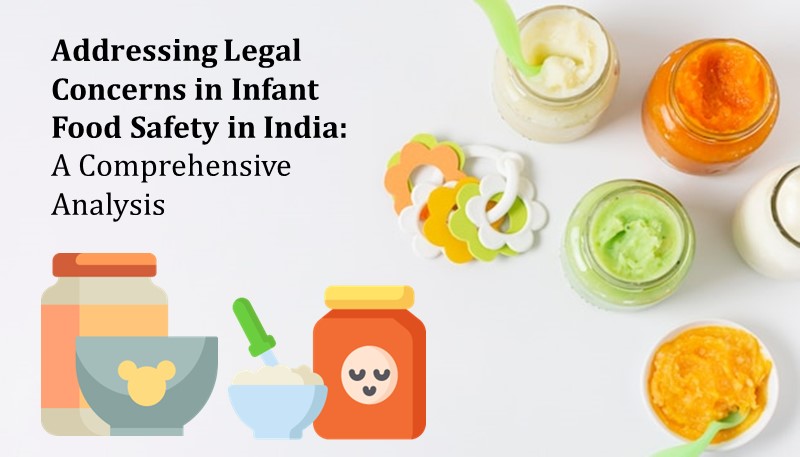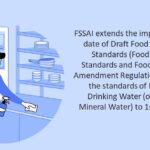Welcoming a newborn into the world brings immense joy and responsibility, including ensuring proper nutrition. As caregivers, safeguarding the safety of the food we provide to infants is of utmost importance. Besides, infant food safety in India presents significant legal concerns that demand attention from all stakeholders. In this blog, we’re discussing how crucial it is to keep baby food safe in India.
Now, let’s delve into a few prevalent issues regarding the foods available for infants in the Indian market:
Contamination and Adulteration:
A primary issue in infant food safety in India is contamination and adulteration. Products may contain harmful substances such as pesticides, excessive sugar, heavy metals, or pathogens during various production stages, posing severe health risks to infants.
Inadequate Labelling and Misleading Claims:
Another prevalent issue is the lack of clear and accurate labelling in the infant food industry. Some products may feature misleading claims about their nutritional content or health benefits, complicating parental decision-making. Terms like “natural,” “organic,” and “nutrient-rich” are commonly used to attract consumers. However, it is crucial for parents to look beyond these buzzwords and scrutinize the actual ingredients and nutritional content of the products.
Regulatory Gaps and Enforcement:
The regulatory framework for infant food safety in India suffers from gaps and inconsistencies, hampering effective enforcement. Despite existing standards, insufficient enforcement mechanisms allow substandard and unsafe products to enter the market.
Deceptive Marketing Practices:
Deceptive marketing practices, including exaggerated or false claims about infant food products, undermine consumer trust and pose legal concerns. These practices must be addressed to protect consumers, especially vulnerable infants, from misleading information.
Recently, infant foods for ages between six months and twenty-four months have been found to contain excess amounts of sugar compared to similar products available in the market. This raises serious concerns about the nutritional health provided by market players for infants.
The Food Safety and Standards Authority of India (FSSAI) plays a crucial role in overseeing and regulating these issues to protect consumers, especially vulnerable infants. Let’s discuss the various regulations/advisories issued by the FSSAI to govern these issues related to infant food available in the market.
Food Safety and Standards (Foods for Infant Nutrition) Regulations, 2020:
This regulation governs the ingredients, constituents, and labelling of foods for infants. According to this regulation, lactose and glucose polymers are designated as the preferred carbohydrates for infant nutrition. Sucrose and/or fructose may only be added, if necessary, as a carbohydrate source, provided that the sum of these does not exceed 20 percent of the total carbohydrate content. The regulation also specifies the list of additives and the source compounds for minerals, vitamins, and other nutrients permitted to be used in infant foods. Additionally, various labelling requirements are mandated, including the stipulation that packaged infant foods must bear the statement “mother’s milk is best for your baby.”
Infant Milk Substitutes, Feeding Bottles and Infant Foods (Regulation of Production, Supply, and Distribution) Act, 1992:
This legislation regulates the production, supply, and distribution of infant milk substitutes, feeding bottles, and infant foods with the aim of protecting and promoting breastfeeding and ensuring the proper use of infant foods. It prohibits individuals from advertising, or participating in the publication of any advertisement, for the distribution, sale, or supply of infant milk substitutes, feeding bottles, or infant foods. Furthermore, it prohibits giving the impression or creating a belief in any manner that feeding of infant milk substitutes and infant foods is equivalent to, or better than, mother’s milk. Additionally, it prohibits participation in the promotion of infant milk substitutes, feeding bottles, or infant foods. Individuals are further prohibited from selling or distributing any infant milk substitute or infant food unless it conforms to the standards specified for such substitute or food under the Food Safety and Standards Act, 2006, and the rules made thereunder. Furthermore, individuals are required to obtain approval from the Central Government for selling any infant milk substitute or infant food if no standard has been prescribed.
FOOD SAFETY AND STANDARDS (PACKAGING AND LABELLING) REGULATIONS, 2011:
This legislation regulates the packaging and labelling of any packaged food product manufactured, distributed, or sold in the Indian market. It requires the container of infant milk substitute or infant food to be labelled with various disclaimers, including:
-
MOTHER’S MILK IS BEST FOR YOUR BABY
-
INFANT FOOD SHALL BE INTRODUCED ONLY (AFTER THE AGE OF SIX MONTHS AND UP TO THE AGE OF TWO YEARS)
-
A statement that infant milk substitute or infant food should be used only on the advice of a health worker as to the need for its use and the proper method of its use.
-
A warning that infant milk substitute or infant food is not the sole source of nourishment for an infant.
Other than the aforementioned legislations regulating the foods available for children in the Indian market, several ministries also issue advisories from time to time.
Recently, the Department for Promotion of Industry and Internal Trade (DPIIT) directed all e-commerce companies/portals to remove drinks/beverages from the category of “health drinks” on their sites/platforms. The National Commission for Protection of Child Rights, following an inquiry under the Commission for Protection of Child Rights Act, 2005, concluded that there is no definition of “Health Drinks” under the Food Safety and Standards Act, 2006, and its allied Rules and Regulations, as submitted by the Food Safety and Standards Authority of India (FSSAI).
In conclusion, ensuring the safety of infant food in India is paramount for the well-being of our babies. Regulations and advisories play a crucial role in maintaining the quality of infant food products and addressing emerging concerns. It is vital for all stakeholders to prioritize the health and safety of infants by adhering to these standards and regulations. Parents must stay vigilant and informed about the risks associated with certain products, while policymakers and regulators must work towards implementing more stringent measures to protect the health and well-being of the youngest members of society.
Written by: Saubhagya Tibrewal
Co-authored by: Zunaid Akhtar Sarkar
Disclaimer
This content is intended for informational purposes only and does not constitute a legal opinion. Despite our efforts to maintain accuracy, we do not make representations, warranties or undertakings regarding the quality, completeness or reliability of the content. Readers are encouraged to seek legal counsel prior to acting upon any of the information provided herein. This content, including the design, text, graphics, their selection and arrangement, is Copyright 2024, Lexplosion Solutions Private Limited or its licensors. ALL RIGHTS RESERVED, and all moral rights are asserted and reserved.
For any clarifications, please reach out to us at 91-33-40618083 or inquiries@lexplosion.in. Refer to our privacy policy by clicking here.





